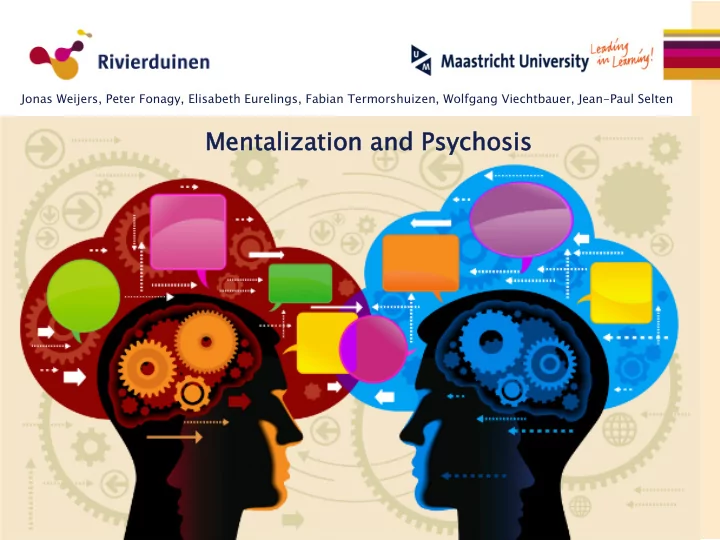

Jonas Weijers, Peter Fonagy, Elisabeth Eurelings, Fabian Termorshuizen, Wolfgang Viechtbauer, Jean-Paul Selten Menta talizati tion and Psychosis
Presenta tati tion about t research from baseline data ta of of MBT RCT MBT RCT - Randomized controlled trial on MBT for patients with Non-affective Psychotic Disorders (schizophrenia, Schizoaffective disorder, delusional disorder etc.) - Based in the Netherlands - N=90 - Still 2 more years to go, so no data yet.
Menta talizing and sympto toms of psychosis Frith (1992): positi tive and negati tive sympto toms expressions of impaired monitoring own menta tal sta tate te and impaired representation of oth ther’s menta tal sta tate te, … i.e. impaired menta talizing ability. .
Impaired monito toring own menta tal sta tate tes: - (Verbal) audito tory hallucinati tions: faulty interpretation of one’s own thoughts as other people’s voices. - Avoliti tion (lack of moti tivati tion): the patient may have intentions, but is unaware of them and so is unable to translate them into behavior. - De Delusions of Contr trol: patient is unaware of intention preceding behavior and attributes it to external an source.
Impaired representa tati tion of oth ther’s menta tal sta tate tes - De Delusions of persecuti tion/reference by definition involve a faulty interpretation of others’ intentions. - Flatte ttening of affecti tive expression: Due to an inability to understand that gestures, intonation and facial expression convey mental states. - Social dysfuncti tion/with thdrawal: Inability to represent other’s mental states will severely complicate te social situ tuati tions, leading to with thdrawal.
De Developmenta tal natu ture of menta talizing - Indeed people with psychotic disorder have severe menta talizing deficits ts (Sprong, 2007) - Frith th under the impression that impaired mentalizing was the result of psychosis itself. - Within Conte text t of MBT menta talizing understood as an acquired ability th through inte teracti tion with sensitive and responsive parents.
Parenta tal Abuse and Menta talizing - Inspired by Fonagy and Chiesa, we set out to examine relation between abuse, mentalizing and symptoms in psychosis. - Parental abuse represents severe lack of mentalizing ability by the parent. - May result in a phobic avoidance of menta talizing on the part of the child (Chiesa and Fonagy, 2014).
Impaired Menta talizing as explanato tory mechanism betw tween CA and Psychosis outc tcome Impaired menta talizing: Childhood Child hood ab abuse use negati tive sympto toms (Sergi, detrimental to 2007) so soc c fun fun (Fett,2011). menta talizing Less evidence for pos pos s sym ymp p (Cichetti, 2003). (Garety, 1999) Impaired Mentalizing Psychotic Childhood Abuse Symptoms Childhood Child hood ab abuse use is a risk factor of ps psych ychos osis is (Varese et al. 2012).
Meth thods N = 90 outpatients with psychotic disorder (schizophrenia, § schizoaffective disorder, psychotic disoder not otherwise specified, etc.) Recruited from community treatment teams around Leiden, the § Netherlands. Drop-out: N = 3 § Tests: § – Childhood Experience of Care and Abuse. – Hinting Task (Mentalizing impairment). – Social Functioning Scale. – Positive and Negative Syndrome Scale.
Results ts: abuse 36,8 % (32) of respondents reported no abuse. § 63,2 % (55) reported at least mild forms of abuse. § 37,9 % (33) reported at least one severe form of abuse. §
MAIN FINDINGS Childhood Pos Symp Abuse ( b = 0.11, P = 0.01) Childhood Neg Symp Abuse ( b = 0.17, P < 0.01) Childhood Soc Fun Abuse
MAIN FINDINGS Mentalizing impairment ( b = 0.06, P = 0.03) Childhood Abuse
MAIN FINDINGS Pos Symp ( P > 0.7) Mentalizing impairment Neg Symp ( b = 1.11, P < 0.001) Soc Fun ( b = 0.5, P = 0.07)
Mediation Analysis Mentalizing impairment ( b = 0.06, P = 0.03) ( b = 1.11, P < 0.001) ( b = 0.10, P < 0.05) Childhood Neg Symp Abuse ( b = 0.17, P < 0.01) Childhood Neg Symp Abuse Mediation: b = 0,07, P < 0,05 One th third of the effect accounted for by im impaired paired menta talizing
Conclusions Conclusions No No associati tion: : Child Childhood hood abu abuse se to so social cial functi tioning; nor menta talizing to positi tive sympto toms. But: t: Child Childhood hood abu abuse se may affect negati tive sympto toms in § adulthood though im impaired paired menta talizing. . Data support that it is a path thogenic me mecha hani nism sm. . Mentalization Based Treatment could therefore affect § negati tive sympto tomen, which are most debilita tati ting and tr treatm tment t resista tant.
Recommend
More recommend